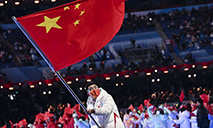Beijing 2022 to 'break even,' has immeasurable long-term economic benefits

Tourists and Beijing residents shop Olympic souvenirs at a brick-and-mortar flagship retailer of licensed merchandise in Wangfujing, Beijing. Photo: Wang Qi/GT
In a sign of their sharp business mind, many Chinese are discussing on social media the balance sheet of the Beijing 2022 Winter Olympics, which concluded just on Sunday but continue to occupy people's mind with lingering effects.
The Beijing Winter Games will have a large chance of breaking even, and may even come at a small profit, industry insiders and analysts predicted, although the long-term economic benefits are what really count, with millions of people to benefit from the Winter Games' legacy in the years, even decades, to come.
While the official audit of the Games is yet to be announced, analysts and economists said the event could basically break even, in line with official forecasts by the organizing committee of Beijing 2022, due to Beijing's implementation of the concept of delivering a frugal Olympic Games, China's advantages in population base and social system.
Unlike many of its predecessors, the Beijing Winter Olympics, the greenest gathering in the history of Olympic Movement, was by no means an extravagant event.
Based on current estimates, the Beijing Winter Olympics have achieved a balanced budget, Yan Jiarong, spokesperson for the Beijing Organising Committee for the 2022 Olympic and Paralympic Winter Games, told a press conference in Beijing on February 1.
Factoring in economic factors including inflation, the overall budget is roughly equivalent to the figure proposed in the original bidding documents, according to Yan.
The budget for the 2022 event was projected at $1.56 billion, 6 percent subsidized by the government, plus a further $1.51 billion in infrastructure renovation outlays - 65 percent coming from social investment, media reported, citing Beijing's bid committee.
Games' gains
The Games' income mainly comprises of sales of broadcast rights, Olympic branded merchandise and tickets, as well as sponsorship.
Beijing 2022 is one of the most widely watched Winter Olympic Games in history, and some estimates are putting broadcast revenues of the Games at $1.1 billion, higher than Pyeongchang 2018's $900 million and Sochi 2014's $800 million, domestic news portal thepaper.cn reported on Monday.
Coinciding with the Spring Festival, the traditional Chinese lunar new year, Olympics-themed merchandise, typified by the sensation of the Games - mascot Bing Dwen Dwen - will likely top 2.5 billion yuan in revenue, according to estimates by Shanxi Securities. In comparison, Olympic souvenirs and branded merchandise raked in about 1.1 billion yuan in terms of economic value in 2008, media reports said.
Without ticket revenues, the stellar viewership and "best in history" revenue from sponsors as well as strong merchandise sales have meant Beijing 2022 could break even, analysts said.
Cao Heping, an economist at Peking University, told the Global Times on Tuesday that from his estimates, the Beijing Winter Games could have had a net profit of around 700 million yuan after expenses are deducted from the revenue.
To put into perspective: The 2008 Summer Olympics ended with an operating profit of more than 1 billion yuan, according to results revealed by the National Audit Office in June 2009.
Much of the credit went to the practice of emphasized frugality in preparing and hosting the Olympic and Paralympic Winter Games, which makes Beijing 2022 one of the most frugal Games in history.
With the 2008 Summer Olympics leaving a rich legacy, China reused multiple existing venues, including the iconic Bird's Nest stadium and the Ice Cube, formerly known as the Water Cube, successfully avoiding the potential for facilities to be left idle after the Games. Eleven venues from Beijing 2008 Olympics were reused in 2022.
Beijing State-owned Assets Management Company, which operates the National Stadium, the Beijing National Aquatics Center and the National Speed Skating Oval, said in a statement it sent to the Global Times that the stadiums were planned taking into account how they will be operated in the future to promote mass sports.
In January, the company posted a net profit of 309 million yuan, up 160 percent year-on-year.
"It can basically break even in regard to the major Olympic stadiums," an insider told the Global Times on Tuesday on condition of anonymity. "We do enjoy strengths in a large population and social system."
The balance sheet of the Beijing Winter Olympics not only interested Chinese netizens, but a number of foreign news outlets were also keen on whether Beijing 2022 will become a money-losing business.
After all, the Pyeongchang 2018 Winter Olympics in South Korea cost about $13 billion while the Sochi 2014 Games in Russia came in at an enormous $50 billion. This time, epidemic control measures meant an increase in operating costs. Such measures accounted for 3 percent of the total cost of Tokyo Summer Olympics last year, according to Guoyuan Securities. The estimated official cost of the Tokyo Olympics was purportedly $13.6 billion.
A New York Times report on February 14 noted that the operating costs of Olympic Games since 1960 have averaged nearly three times what the host cities originally estimated in their bids, and reported that the Chinese did not count long-term infrastructure investments made in the years before the Games.
German broadcaster Deutsche Welle went further, reporting that budget overruns are a sure thing and the actual cost of the Beijing Games may be tenfold the original plan.
The official response from the Beijing organizing committee was that there have been some changes to the environment for hosting the Beijing Winter Olympics, but the budgeted income and spending has been well-planned by the organizing committee.
Cao noted the insistence on counting on the costs of high-speed railways and roads violates accounting rules, as depreciation of these projects will happen in a time span of decades.
There is one more point, Cao noted, that the traffic connections to high-quality ski facilities in those northern hilly areas actually bode well for China - as 22 million residents from Beijing, 5 million from Hohhot in North China's Inner Mongolia Autonomous Region and 3 million from Zhangjiakou in North China's Hebei Province will gain access to a Beijing-Zhangjiakou sports tourism cluster after the Winter Olympics, all within a one-hour economic circle.
Lasting effect
Analysts said the long-term benefits of Beijing 2022 are immeasurable as China realized the goal of "getting 300 million Chinese to participate in winter sports" during the preparation for the Games.
President of the International Olympic Committee (IOC) Thomas Bach said in a Sunday interview that Beijing 2022 will change the landscape of winter sports forever and the Chinese ice and snow market could grow into a $150 billion market by 2025.
Some of the economic benefits are already there. In the past seven years, Zhangjiakou has built 39 ski resorts and 17 indoor skating venues, creating 400,000 local jobs.
Manufacturers also benefited from the grand sporting event. During the Winter Olympics, Alibaba's AliExpress said the overseas sales of Chinese ski products increased by more than 60 percent year-on-year, including a 15-fold increase in domestically made ski helmets.
Furthermore, Chinese technologies used in the Games including the high-speed 4K "cheetah" camera stand a good chance to be adopted into the global sporting ecosystem after their use in the Beijing, thepaper.cn reported.
Wu Bin, vice chairman of Beijing Ski Association, told the Global Times on Tuesday that with the Games' boost in infrastructure, manufacturing and demand, he expects the ice and snow mania in China will last for many years to come.
The ski market, in particular, is expected to accelerate, Wu said. "In 2021, the number of domestic skiers increased to 20.76 million, surpassing pre-virus levels and doubling what was recorded in 2014."
It is expected that by 2030, the number of domestic skiers will be close to 60 million, said Wu.
Some 323.3 billion yuan could be generated from tourism-related revenue in ice and snow sports in the 2021-22 period, per a winter sport tourism report by the China Tourism Academy released in January.
Another report on the winter sports industry found the scale of China's snow and ice industry rose from 270 billion yuan to 600 billion yuan between 2015 and 2020. The world's second-largest economy is now eyeing a target of 1 trillion yuan by 2025.
Photos
Related Stories
- Beijing Winter Olympics vivid example of how people around the world support each other in pursuing dreams
- Philippine officials laud China for Beijing Winter Olympics' success
- Lebanese ski players hail dreamy, exciting Olympic trip in Beijing
- Wonderful moments of the Beijing Olympics in sand paintings
- Inheritors of intangible cultural heritage in NW China’s Ningxia create artworks to show support for Beijing 2022
Copyright © 2022 People's Daily Online. All Rights Reserved.










